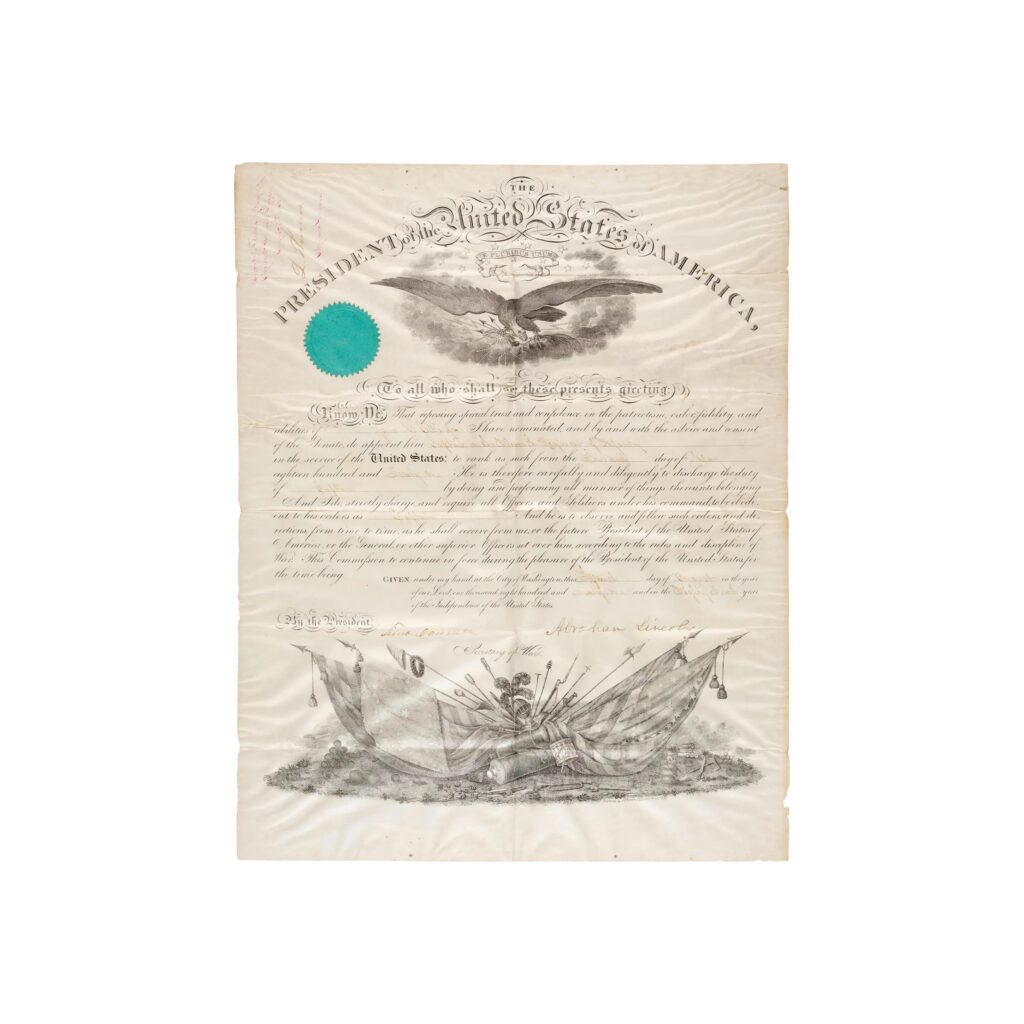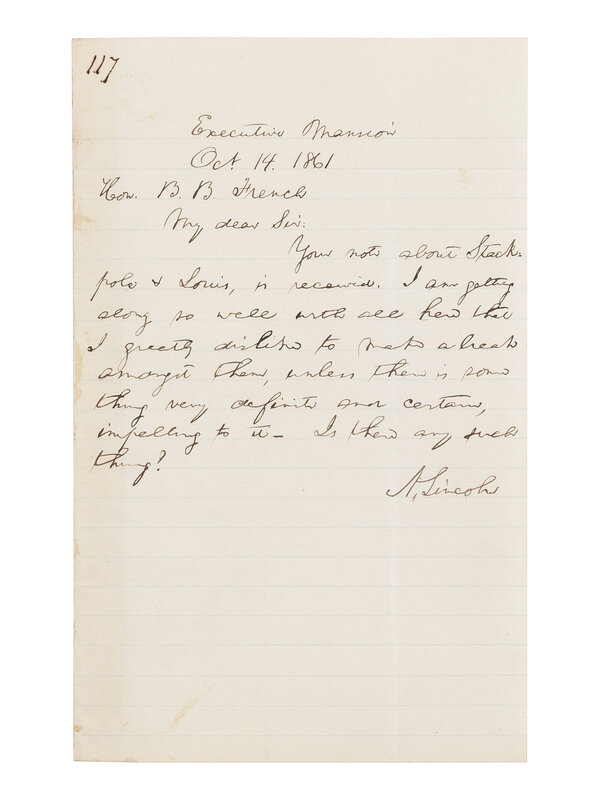TRULY HISTORIC LETTER FROM JAMES MADISON REGARDING THE PROSPECTS OF WAR WITH ENGLAND
Manuscript letter signed (“James Madison”) as Secretary of States, to William Pinckney, Minister Plenipotentiary to Great Britain, discussing congressional posturing over the Embargo Act of 1807
3 pages (252 x 204 mm) on a bifolium of wove paper (watermarked Magnay & Pickering | London 1804), “Department of State” (Washington, D.C.), 5 December 1808, reception docket on verso of second leaf; very light marginal browning, some fold separations. Accompanied by two contemporary clerical copies of related diplomatic letters, both in the hand of the same secretary as the letter by Monroe, both on the same paper stock, and both docketed by Pinckney: (1) David M. Erskine to Madison, Washington, D.C., 18 November 1808, one page, informing Madison of a “strict Naval Blockade” of the French Leeward Islands by the British Navy ordered by Admiral of the Blue Sir Alexander Inglis Cochrane; (2) James Madison to Pinckney, “Department of State” (Washington, D.C.), 25 November 1808, 2 pages, covering an account of recent congressional deliberations and a copy of Erskine’s letter.
“It seems not to be understood however, that these decisions, if confirmed by the House, preclude a question on a resort to war. …”
The secretary of state informs the U.S. minister to Great Britain that the ineffectiveness of the Embargo Act, which Jefferson had put forward after rejecting a treaty intended to end the harassment of American ships and seamen that had been negotiated with Great Britain by Monroe and Pinkney. “The diplomatic neutrality of the United States was tested during the Napoleonic Wars (1803–1815). The warring nations of Britain and France both imposed trade restrictions in order to weaken each other’s economies. These restrictions also disrupted American trade and threatened American neutrality. As time went on, British harassment of American ships increased. Controversial measures included British impressment of American men and seizure of American goods. After the Chesapeake Affair in June 1807, pitting the British warship Leopard against the American frigate Chesapeake, President Thomas Jefferson faced a decision regarding the situation at hand. Ultimately, he chose an economic option to assert American rights: The Embargo Act of 1807” (Thomas Jefferson Encyclopedia: https://www.monticello.org/research-education/thomas-jefferson-encyclopedia/embargo-1807/).
The embargo, however, had little effect on the United Kingdom, while crippling American manufacturing in the north and agriculture in the south. Agitation quickly mounted for its repeal, as Monroe here describes: “My two last letters were of November 9th and 25th. The first went by a British packet from New York; the second by a vessel which has sailed, or is about sailing from Boston. This will be forwarded to New York, to be conveyed by a packet which is to sail on the 8th. It is accompanied by a continuation of the debates and proceedings of Congress, as far as they have yet appeared in print. You will find that a question has been taken in the Senate, on the repeal of the Embargo, and negatived by a very large majority, and that questions have been taken also, in Committee of the whole in the House of Representatives on the resolutions proposed by the Committee on the part of the Presidents message relating to our foreign affairs; without dissent to the first and third, and with the concurrence of a great majority in favor of the second. It seems not to be understood however, that these decisions, if confirmed by the House, preclude a question on a resort to war, if that course should be judged preferable before the close of the Session. The Senate, I am informed is now engaged in amending the Embargo laws, with a view, in case that system should not be superseded, to put an effectual stop to the violations and evasions which have so much crippled its operation.”
Madison was clearly hoping for some diplomatic assistance in resolving the issue from his and Pinckney’s British counterparts: “I have received no letter from you since the return of the Hope. I look for that pleasure by the arrival of the British October packet which has been expected from day to day for some time past. I infer from conversations with Mr [David M.] Erskine [British Minister to the United States] that Mr [George] Canning [British Foreign Minister] is probably engaged in modifications of the orders in Council, expected to render them less offensive here. But whilst the principle of the orders is retained, the effect of the modifications will doubtless disappoint the British Cabinet, as much as it will be disappointed by that of Mr. Canning’s letter to you of the 23d. of Sept. last.”
The Embargo Act was repealed and replaced by the Non-Intercourse Act just days before Madison succeeded Jefferson in the White House in early March 1809. Madison’s continuing efforts to establish American neutrality while rebuilding the nation’s economy came to naught and the United States declared war on the United Kingdom three years into his administration, 18 June 1812.
REFERENCE:
The Papers of James Madison (Early Access document: https://founders.archives.gov/documents/Madison/99-01-02-3781)
PROVENANCE:
Christie’s New York, 19 June 2007, lot 274 (Property from a Private Collection)




